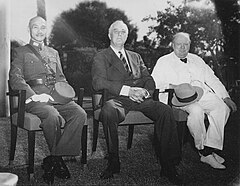Cairo Conference
This article may be expanded with text translated from the corresponding article in Chinese. (August 2018) Click [show] for important translation instructions.
|
 Chiang Kai-shek, Franklin D. Roosevelt, and Winston Churchill at the conference on 25 November 1943 | |
| Date | November 22–26, 1943 |
|---|---|
| Venue | Residence of Alexander Comstock Kirk |
| Location | Cairo, Egypt |
| Also known as | Sextant (codename) |
| Participants |
|
| Outcome | Establishing the Cairo Declaration |
The Cairo Conference (codenamed Sextant[1]) occurring November 22–26, 1943, held in Cairo, Egypt, outlined the Allied position against the Empire of Japan during World War II and made decisions about postwar Asia.
Background[]
The conference was proposed by Franklin D. Roosevelt, President of the United States as worries grew that the Republic of China was faltering under heavy inflation and chronically low morale. Roosevelt wanted to give China the status of the fourth Great Power after the war, shoring up Sino-American relations amidst conflict between the overall commander of US forces in China Joseph Stilwell and generalissimo Chiang Kai-shek.[2]
Description[]
The meeting was attended by Roosevelt, Chiang and Winston Churchill, prime minister of the United Kingdom. Soviet leader Joseph Stalin did not attend the conference as his meeting with Chiang could have caused friction between the Soviet Union and the Empire of Japan (the Soviet-Japanese Neutrality Pact of 1941 was a five-year agreement of neutrality between the two nations; in 1943 the Soviet Union was not yet at war with Japan, whereas China, the UK and the US were).
The Cairo meeting was held at a residence of Alexander Comstock Kirk, the American ambassador to Egypt, near the Giza Pyramid complex, about 8 miles (13 km) from the city center of Cairo itself. [3]
Two days later, Stalin met with Roosevelt and Churchill in Tehran, Iran for the Tehran Conference.
The Americans, not wanting the French to return to Indochina, had offered Chiang Kai-Shek entire control of French Indochina, but Chiang Kai-Shek publicly declined.[4]
The Cairo Declaration was issued on 27 November 1943 and released in a Cairo Communiqué through radio on 1 December 1943,[5] stating the Allies' intentions to continue deploying military force until Japan's unconditional surrender. The main clauses of the Cairo Declaration are that the three great allies are fighting this war to restrain and punish the aggression of Japan, they covet no gain for themselves and won't involve themselves in territorial expansion wars after the conflict, "Japan be stripped of all the islands in the Pacific which she has seized or occupied since the beginning of the First World War in 1914", "all the territories Japan has stolen from the Chinese, such as Manchuria, Formosa, and the Pescadores, shall be restored to the Republic of China", Japan will also be expelled from all other territories which she has taken by violence and greed and that "in due course Korea shall become free and independent".
See also[]
- Cairo Conference (1921)
- Second Cairo Conference
- Second Sino-Japanese War
- List of World War II conferences
- Korean independence movement
References[]
- ^ Churchill, Winston Spencer (1951). The Second World War: Closing the Ring. Houghton Mifflin Company, Boston. p. 642.
- ^ Department Of State. The Office of Electronic Information, Bureau of Public Affairs (2008-07-18). "The Cairo Conference, 1943". 2001-2009.state.gov. Retrieved 2021-12-06.
- ^ Life: Noel F. Busch, "Alexander Kirk," August 13, 1945, accessed January 23, 2011
- ^ "Indochina, France, and the Viet Minh War, 1945-1954: Records of the U.S. State Department, Part 1: 1945-1949" (PDF). Retrieved 10 November 2018.
- ^ "Cairo Communique, December 1, 1943". Japan National Diet Library. December 1, 1943.
Further reading[]
- Ehrman, John (1956). Grand Strategy Volume V, August 1943‒September 1944. London: HMSO (British official history). pp. 155, 172, 183‒202.
- Heiferman, Ronald Ian (2011). The Cairo Conference of 1943: Roosevelt, Churchill, Chiang Kai-shek and Madame Chiang. Jefferson, NC: McFarland & Company.
- Sainsbury, Keith (1986). The Turning Point: Roosevelt, Stalin, Churchill, and Chiang Kai-Shek, 1943: The Moscow, Cairo, and Teheran Conferences. Oxford: Oxford University Press.
- Leighton, Richard M. (1960). "Chapter 10: Overlord Versus the Mediterranean at the Cairo-Tehran Conferences". In Kent Roberts Greenfield (ed.). Command Decisions. United States Army Center of Military History. CMH Pub 70-7.
External links[]
- Aftermath of World War II
- World War II conferences
- Diplomatic conferences in Egypt
- 1943 conferences
- 1943 in Egypt
- 1943 in international relations
- Conferences in Cairo
- 1940s in Cairo
- November 1943 events
- 1943 in military history